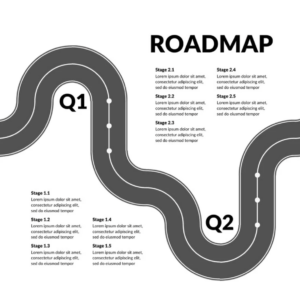Defining your goals is a crucial step in developing a content strategy. Without clear goals, it can be difficult to measure the success of your content efforts and make informed decisions about what types of content to create and promote.
To define your goals when developing a content strategy, you can follow these steps:
- Identify your business objectives: The first step in defining your goals is to understand what your organization wants to achieve with its content. Some common business objectives include increasing sales, building brand awareness, and generating leads. Consider what your organization hopes to accomplish with its content, and use this information to inform your goals. It’s important to keep in mind that your content strategy should align with your overall business objectives and support your overall marketing efforts.
- Understand your audience: Conduct research to learn about your target audience’s needs, interests, and behaviors. Use this information to create content that resonates with them. Understanding your audience will help you identify what types of content will be most valuable to them and what goals will be most relevant to your organization. This will help you develop a content strategy that speaks to your target audience in a way that is most likely to drive engagement and achieve your desired results.
- Set specific, measurable, attainable, relevant and time-bound (SMART) goals: Use the SMART framework to set goals that are specific, measurable, attainable, relevant, and have a specific deadline. For example, instead of setting a general goal like “increase website traffic,” set a specific goal like “increase website traffic by 20% over the next three months.” Setting SMART goals will help you create a clear plan of action and measure progress towards your goals. Additionally, it will also help you communicate your goals effectively to the rest of your organization and get the support you need to achieve them.
- Define key performance indicators (KPIs): Identify specific metrics that will help you track the performance of your content and measure progress towards your goals. Examples of KPIs include website traffic, social media engagement, lead generation, and conversions. By defining your KPIs, you will be able to track the performance of your content over time and make data-driven decisions about what types of content to create and promote. These KPIs will also help you understand how your content is impacting your business objectives.
- Prioritize your goals: Consider the resources you have available and prioritize which goals are most important to your organization. It is important to understand that you won’t be able to accomplish everything at once, so it’s important to focus on the goals that will have the most impact on your organization. Prioritizing your goals will also help you allocate your resources effectively and stay on track to achieve your most important objectives.
- Review and adjust: Continuously monitor your progress and adjust your goals as needed. Regularly evaluate the effectiveness of your content strategy, and adjust your goals and tactics as needed. It is important to review and adjust your goals regularly, as your audience and business priorities may change over time. Additionally, it’s essential to stay abreast of industry trends and adjust your strategy accordingly.
Developing a content strategy is an ongoing process that requires regular monitoring and adjustment. By defining your goals, you will be able to create a content plan that aligns with your objectives and helps you measure the success of your content efforts. Additionally, having clear and measurable goals will help you make data-driven decisions about what types of content to create and promote, and how to optimize your content for better results over time.
It is also important to remember that your content strategy should be flexible and should be able to adapt to changes in your business and in the marketplace.








